A match made in heaven: The explosion of betting ads in European football
A regulatory back door is being exploited by criminals to use football to advertise unregulated gambling brands targeted at Asian countries where gambling is prohibited. Football's desperation for cash after COVID-19 lockdowns has enabled this industry to thrive.
If you want a picture of how betting advertising has come to dominate football, pay a visit to Villa Park, the football stadium in the British city of Birmingham that is home to Premier League club Aston Villa.
When Manchester City visited the stadium in early December 2023, it was impossible to ignore the parade of betting ads displayed on the digital billboards that surround the pitch.
Ads for brands like Bet365 and the US-facing BetMGM were rotated on the billboards with such regularity that not a single minute of play took place without betting ads on display and typically surrounding the entire field of play.
Up the road at the Molineux Stadium in the British city of Wolverhampton, Premier League club Wolverhampton Wolves has gone one step further. Here, billboards have been extended vertically by placing a second row a few steps behind the original perimeter advertising.
Some other clubs, with less space than the Molineux stadium, have removed the first rows of seats and installed a second wall of digital billboards. This allows them to surround their pitch with a wall of advertisements that appear on TV, and it is almost as tall as the players on the field.
With this, they can give a platform not just to licensed and legitimate bookmakers like Bet365, Betway and Unibet - but also to companies like 6686bet which target Asian markets where betting is illegal or restricted. 6686bet is a sleeve sponsor of Wolverhampton Wolves, and it is also operating without a functional licence as part of a group of companies which have been linked to illicit industries, including a cyber scam compound in Cambodia.
Perimeter advertising at the Molineux Stadium in Wolverhampton is double-layered, meaning that betting adverts often appear taller than the players on screen (screenshot from Optus Sport)
An analysis by Play the Game found that 17 betting brands featured on pitchside billboards during matchweek 15 of the Premier League in 2023.
Analysis of betting brands that featured at FA Premier League games during Matchweek 15 (graphic produced by authors)
At the Villa Park stadium in Birmingham, every game featured at least one betting brand, and a betting brand was visible on pitchside billboards during every minute of play. Two of the advertised gambling brands, Fun88 and eKings, appear to be unlicensed.
In fact, gambling advertising is so ubiquitous that many clubs have ‘hidden’ deals to service countries outside of Europe.
Chelsea, for instance, lists almost two dozen companies on its ‘club partners’ page. To learn about its deal with gambling operator Kaiyun, however, you would need to use Google to locate the otherwise-hidden page on the Chelsea website which describes the Chinese-facing bookmaker as ‘an official partner.’
Screenshot illustrating that English Premier League club Chelsea has partnered with Chinese-facing gambling operator Kaiyun.
Virtual ads are imposed on billboards in matches on television
Another way that ads for unregulated bookmakers travel from football pitches in Europe to the eyeballs of football fans in Asia is through the use of virtual ad technology.
Virtual ad technology makes it possible to seamlessly impose ads targeted at different broadcast markets onto pitchside billboards, and in that way, Asian-facing gambling brands are able to feature in Asian La Liga broadcasts - even though there is a blanket nationwide ban on gambling advertising at venues in Spain.
The screenshots below from a match between Real Madrid and Mallorca show how it works.
The first screenshot is the ‘world feed,’ as it was screened by Optus Sports in Australia. It shows the moment, as it happened, where Antonio Rudiger heads in the game's only goal. The ad on the billboard is for the gambling brand KY313.com, otherwise known as Kaiyun.
The second screenshot shows the moment from a different angle, as it was replayed, without enabling virtual ad technology. It reveals that it was in fact an Adidas advertisement that was on the billboard as the goal went in.
Bundesliga clubs are also filling their ‘world feed’ broadcasts with ads for illegal bookmakers without anyone at home knowing about it.
Where fans at the stadium in Dortmund might see an ad for a local cybersecurity company, fans watching in Asia will see ads for Kaiyun (KY313.com) and other bookmakers that either operate without a licence or under a falsified one.
We have observed this happening at multiple venues in Germany this season. However, only one of the clubs contacted by Play the Game, Werder Bremen, took action to ensure this did not continue.
The technology that enables this practice is devised and sold by European companies such as SUPPONOR and the Interregional Sports Group (ISG), and many of these deals are organised by Swiss marketing company Infront Sports & Media headed by Philippe Blatter, nephew of former FIFA President Sepp Blatter. The company did not reply to questions about its involvement in these deals.
So-called ‘news' sites are another way to reach targets in Asia
Another tool used by illegal operators is the launch of a ‘news’ site to promote a gambling brand. On 6 December, eKings News advertised on perimeter boards at Fulham’s game against Nottingham Forest.
But the aim is not to promote a news site, but a connected gambling brand. eKings is, in fact, the official Asian gaming partner of Spanish club Sevilla. It also does not hold a valid licence.
Its licence page lists its owner, Kings Technology N.V., but doesn’t list ekingswin.com as a ‘verified’ domain. It also doesn’t hold any sort of agreement to advertise in Great Britain, 'white label' or otherwise, hence the launch of a ‘news’ site.
Again, the target is Asian countries where gambling is restricted (in this case, India). The eKingsWin.com website is not accessible from the UK but can be accessed using an Asian Virtual Private Network (VPN). On that website, it also claims to have partnerships with Leicester City and Juventus.
'White label' agreements enable overseas advertising
Most of the gambling brands that advertise through European football matches are not interested in the UK market. They want to promote their gambling brand to Asian and Chinese fans of European football by ensuring that it appears in the very popular football TV broadcasts and live feeds - even though gambling is illegal or restricted in many Asian countries.
Overseas gambling brands can advertise in Europe because many jurisdictions in Europe allow the practice of so-called ‘white label’ agreements, including Italy, Germany, Great Britain and Spain.
‘White label’ agreements allow gambling brands to advertise in those European jurisdictions and, therefore, appear in broadcasts screened in Asia. It refers to an agreement where a licence holder in a particular jurisdiction (for example Great Britain) operates a website for an overseas gambling brand. In effect, a licence is rented to an overseas gambling brand, which can then operate a local site.
‘White label’ providers (there are many) often charge a fee for this service. That can involve a revenue-sharing agreement for any new customers brought in via this arrangement - which is ideal for laundering money.
It is a lucrative business. Operators licensed by the British Gambling Commission have over 700 ‘white label’ partners. This is only marginally less than the 866 betting businesses in total that have their own license from the Commission.
A long list of football partnerships with gambling operators
The list of European clubs, leagues, and national teams that have entered into partnerships and sponsorships with unregulated, Asian-facing gambling operators is long.
The tables below show the full list of former and current partnerships between football entities and Asian-facing gambling brands going back to 2006 when Tottenham Hotspur became the first European club to take an Asian-facing sports betting operator as its shirt sponsor.
This list was compiled over a year from open-source material, industry publications, and internal club communications. It features many partnerships which have never been made public in Europe, as many clubs shun the adverse publicity they could get from associating with brands which operate on the fringe of legality (or outside it) in their target markets in Asia.
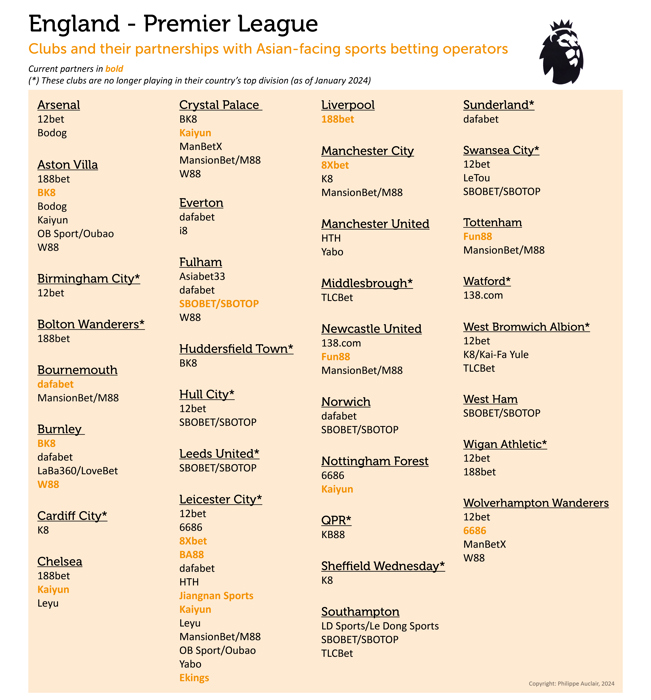
Logo credit: Catherine Ivill/Getty Images
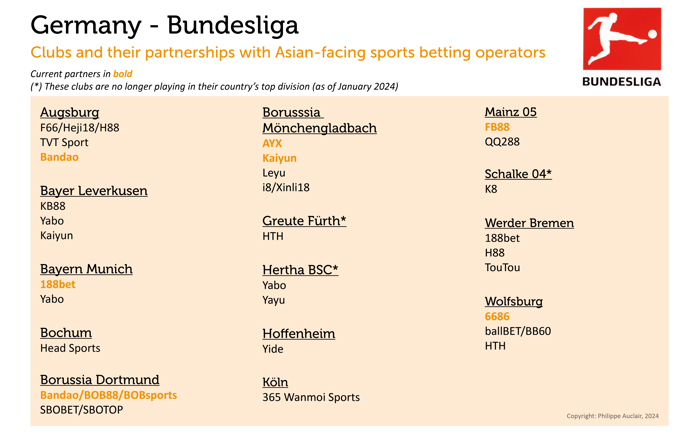
Logo credit: SOPA Images/Getty Images
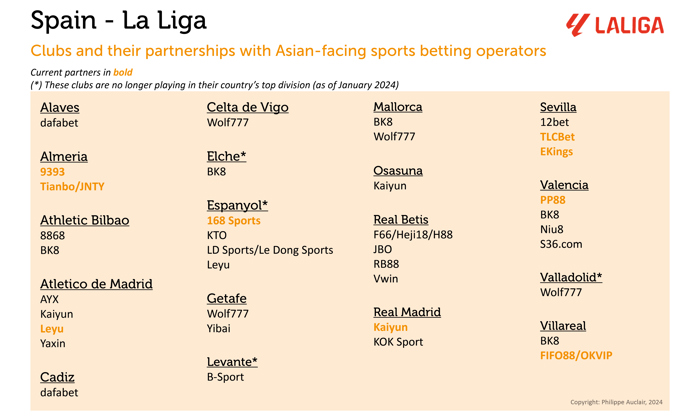
Logo credit: SOPA Images/Getty Images
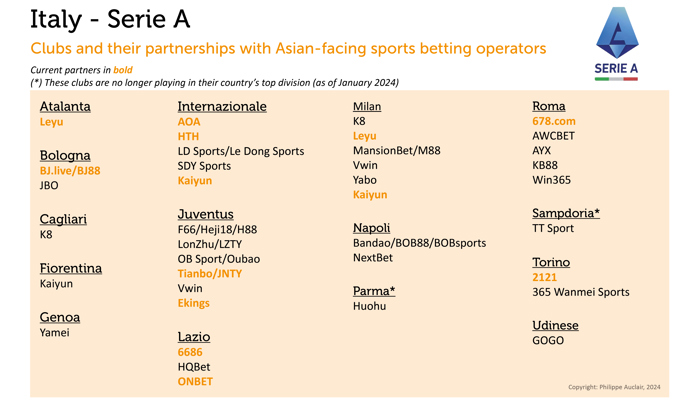
Logo credit: Mondadori Portfolio/Getty Images
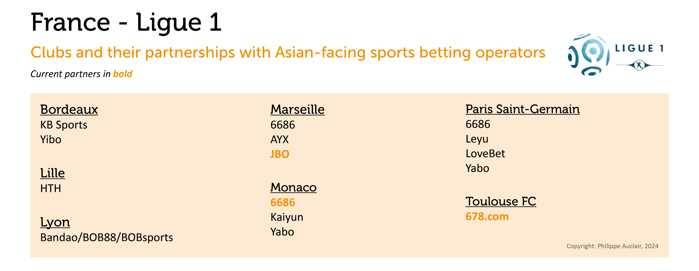
Logo credit: SOPA Images/Getty Images
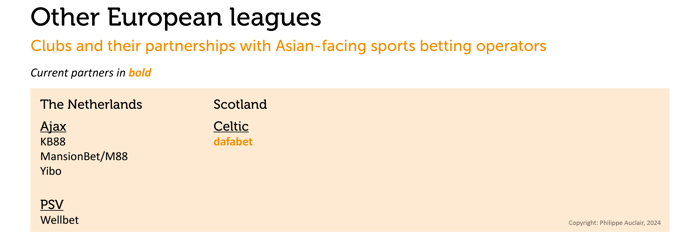

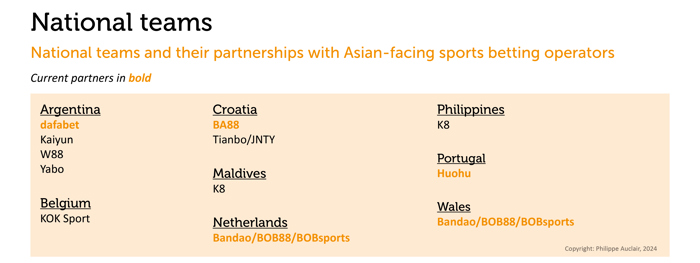
Football now sponsors gambling
But why do gambling brands work with very visible clubs and leagues in European football rather than conducting their illicit activity on the dark net, away from the eyes of police authorities and the public?
There are two reasons: Advertising and to make illegal earnings look legitimate.
Background research by Play the Game has found that 565 million people are interested in football in China. This compares to 42.4 million in Germany; 35 million in the UK; 33.7 million in Italy; 29.1 million in France; and 27 million in Spain.
It doesn’t take a mathematical genius to work out that there are more people interested in football in China than there are in Europe’s five main football markets combined.
Just 14 per cent of Chinese sports fans watch English Premier League football. However, given that 565 million people are understood to be interested in football in China, that represents a potential audience of 79.1 million. That is larger than the UK’s entire population.
So the potential market for gambling is huge in Asia, which is one reason for the rise of betting adverts on stadiums in Europe. Another is that Asian crime gangs needed a new way to launder money after the COVID-19 lockdowns.
The gangs traditionally laundered money via ‘junkets’ where a casino offers an intermediary commission for introducing players to the casino based on the amount they wager at that casino. It often took place in real-world casinos in gambling-friendly havens, such as Macau.
However, at the end of January 2020, visits to casinos abruptly stopped due to COVID-19 lockdowns. Criminals now faced a serious problem. They still needed to launder money, but their traditional method had been abruptly shut down. Cash and casinos were no longer king.
In a 2021 report, the Asian Racing Federation predicted that Asian casino junkets operators, dominated by triads, would diversify into online betting. Not only did they do this, but they also diversified into other online scams, using their online betting operations to launder money earned from the scams.
COVID-19 also meant empty football stadiums. Research by Sheffield Hallam University found that English football clubs lost 1 billion British pounds in revenue due to the pandemic. Clubs, leagues, national associations and federations were desperate for income, and less likely to ask questions about the origins of sponsorship money.
Post-2020, the entire junket operation began to shift online. For the Asian crime gangs, the move was a necessity. Money from criminal activities still needed to be mingled with ‘legitimate’ earnings, especially if criminals had diversified into other online crimes.
A ‘white label’ partnership to launch a European-facing website provides a veneer of legitimacy. An illegal betting operation now has a legal arm and can claim that at least part of its revenue comes from the European-facing website - even if it never attracts a single customer. Revenue-sharing agreements facilitate this - especially if the ‘white label’ provider is controlled by the illegal betting operation.
European football’s desperation for money provides the perfect background for this set-up. Gambling used to sponsor football. Football now sponsors gambling. Criminals are using European sports to illegally target customers in markets where gambling is prohibited.
Why is this important? An unregulated gambling operator doesn’t have to report suspicious bets that indicate match-fixing. It doesn’t have to contribute towards addiction prevention measures, or even pay out to winners. It may even have links to organised crime.





